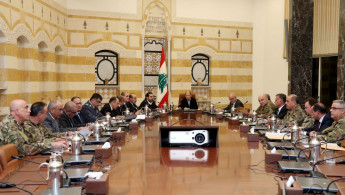Israel 'agrees to discuss borders', US tells Lebanon
A top US envoy has said Israel agreed to discuss disputed land and sea borders with Lebanon, which is eying hydrocarbon exploration off its coast, two Lebanese officials said on Tuesday.
The Israeli foreign ministry did not immediately respond to a request for comment from AFP.
Last year, Lebanon signed its first contract to drill for oil and gas in its waters, including for a block disputed by its southern neighbour Israel, with which it has fought several wars.
The US State Department's acting assistant secretary for Near Eastern affairs, David Satterfield, held a meeting in Beirut on Monday on his second visit in a week.
Satterfield "told officials Israel had agreed to hold negotiations to draw up the maritime border" with Lebanon, an official source who attended the meeting told AFP.
The Jewish state also agreed to discuss the territorial frontier between the two countries, including several disputed areas, the source said.
A delegation from each side would take part in talks at the headquarters of the UN peacekeeping force in south Lebanon, UNIFIL, but the latter would not be a party to the talks, he added.
Another source familiar with the plan said negotiations would begin soon.
"There has been positive progress overall, and the issue is down to the last details before the start of the negotiations," they said.
Israel and Lebanon are still technically at war, although the last Israeli troops withdrew from southern Lebanon in 2000 after two decades of occupation.
Israel Defense Minister Avigdor Lieberman has described as "very provocative" Lebanon's offshore oil and gas exploration tender and suggested that Lebanon had put out a tender to international groups for a gas field "which is by all accounts ours (Israeli)."
But Lebanon has ignored Israeli claims that exploration in these contested waters would be a provocative act, opening up offers to exploration of blocs.
A consortium composed of energy giants Total, ENI and Novatek was awarded two of Lebanon's 10 exploration blocks last year.
It is set to start drilling in block 4 in December, and later in the disputed block 9.
Total welcomed the deal, saying it stipulates that drilling will take place in "at least one well per block in the first three years" and that the "consortium's priority will be to drill a first exploration well on Block 4" in 2019.
"As for block 9, Total and its partners are fully aware of the Israeli-Lebanese border dispute in the southern part of the block that covers only a very limited area (less than eight percent of the block's surface).
"Given that, the main prospects are located more than 25 km (15.5 miles) from the disputed area, the consortium confirms that the exploration well on block 9 will have no interference at all with any fields or prospects located south of the border area."
The situation at the time led to worsening relations between the two countries. A war-of-words was sparked by Israeli claims to the waters, which Beirut believes is an attempt by Tel Aviv to exploit its possible new-found wealth.
The construction by Israel of a border wall on territory disputed by Lebanon has also led to angry reactions from Beirut.
On April 5, Lebanon invited international consortia to bid for five more blocks, which include two also adjacent to Israel's waters.
Follow us on Twitter: @The_NewArab





 Follow the Middle East's top stories in English at The New Arab on Google News
Follow the Middle East's top stories in English at The New Arab on Google News
![Israeli forces ordered bombed Gaza's Jabalia, ordering residents to leave [Getty]](/sites/default/files/styles/image_330x185/public/2176418030.jpeg?h=a5f2f23a&itok=_YGZaP1z)

